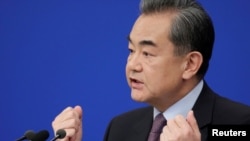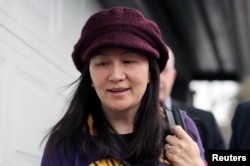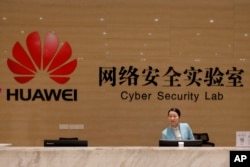Chinese Foreign Minister Wang Yi on Friday called the legal clash between Chinese company Huawei and the U.S. government "deliberate political suppression," and he vowed to protect the rights of Chinese companies and citizens abroad.
"It's quite obvious to any fair and unbiased person that the recent action against a particular company and Chinese individual is not just a pure judicial case but deliberate political suppression," Wang said on the sidelines of China's annual parliament session.
"We have already and will continue to take all necessary steps and resolutely safeguard the legitimate rights and interests of Chinese companies and citizens," he said, though he did not elaborate on what those steps would be.
Washington has banned U.S. companies from using Huawei technology, warning that doing so could result in security breaches.
In December, Canadian authorities arrested Meng Wanzhou, Huawei's chief financial officer, on U.S. charges that she violated sanctions against Iran. Her extradition hearing is to begin May 8.
Since Meng's arrest, two Canadians have been arrested in China, and a third who was already in Chinese prison for a drug crime has seen his sentence switched from 15 years to death.
On Thursday, Huawei announced it had filed a lawsuit in the U.S., arguing that legislation Congress passed last year restricting Huawei business in the United States was "unconstitutional" because it singled out the company for penalties.
The United States has also warned other countries that Huawei technology could allow Chinese intelligence agents to infiltrate their networks.
"This ban is not only unlawful but also harms both Huawei and U.S. consumers," Huawei's rotating chairman, Guo Ping, told reporters Thursday in Shenzhen.
No choice
Guo said that Huawei was left with no choice but to take legal action, noting that neither lawmakers nor the government had shown any proof to date to back up concerns the company is a security risk.
China expert Dean Cheng of the Davis Institute for National Security and Foreign Policy told VOA's Xu Ning that even though Huawei is not owned by the Chinese government, it would probably cooperate with the government if asked to.
"Huawei is not a state-owned enterprise," Cheng said, but "broadly speaking, Chinese companies will respond to requests or demands from the Chinese government."
In addition, he said, "Huawei coding appears to be often very poor. Whether that's deliberate or not is unclear. But Huawei has also been very, very slow in addressing those issues. So we have a fundamental quality control issue here."
Julian Ku, a constitutional law professor and associate dean at Hofstra University in Hempstead, N.Y., told VOA's Qiao Zhan that Huawei has a minimal chance of winning, but "not an impossible chance."
He said the United States would probably file a motion to dismiss the Huawei case, arguing that Huawei's legal claims "don't have any basis so we don't need to go to trial because no evidence is required to resolve the case." Then, he said, the court would most likely schedule a hearing to consider that argument.
U.S. vigilance
On Thursday, U.S. State Department deputy spokesman Robert Palladino declined to comment on the pending lawsuit, but said the government needs to be vigilant when making procurement decisions.
"The United States advocates for secure telecom networks and supply chains that are free from suppliers subject to foreign government control or undue influence, which would pose risks of unauthorized access and malicious cyber activity," said Palladino in response to questions posed by VOA during a briefing.
"We believe that these risks posed by vendors subject to extrajudicial or unchecked compulsion by foreign states that do not share our values need to be weighed rigorously before making procurement decisions on these technologies," he added.






